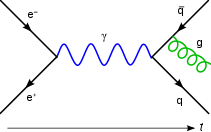astro.wikisort.org - Science
Quantum cosmology[1][2] is the attempt in theoretical physics to develop a quantum theory of the universe. This approach attempts to answer open questions of classical physical cosmology, particularly those related to the first phases of the universe.
| Quantum field theory |
|---|
 |
| History |
Classical cosmology is based on Albert Einstein's general theory of relativity (GTR or simply GR) which describes the evolution of the universe very well, as long as you do not approach the Big Bang. It is the gravitational singularity and the Planck time where relativity theory fails to provide what must be demanded of a final theory of space and time. Therefore, a theory is needed that integrates relativity theory and quantum theory.[3] Such an approach is attempted for instance with loop quantum cosmology, loop quantum gravity, string theory and causal set theory.[4]
In quantum cosmology, the universe is treated as a wave function instead of classical spacetime.[5]
See also
- String cosmology
- Brane cosmology
- Loop quantum cosmology
- Top-down cosmology
- Non-standard cosmology
- Loop quantum gravity
- Canonical quantum gravity
- Dark energy
- Minisuperspace
- Hamilton–Jacobi–Einstein equation
- Theory of everything
References
- Bojowald, Martin (2011). Quantum Cosmology. A Fundamental Description of the Universe. Lecture Notes in Physics. Vol. 835. Springer. ISBN 978-1-4419-8276-6.
Notes
- Bojowald, Martin (2015). "Quantum cosmology: A review". Reports on Progress in Physics. 78 (2): 023901. arXiv:1501.04899. Bibcode:2015RPPh...78b3901B. doi:10.1088/0034-4885/78/2/023901. PMID 25582917. S2CID 18463042.
- Chiou, Dah-Wei (2015). "Loop quantum gravity". International Journal of Modern Physics D. 24 (1): 1530005–1530331. arXiv:1412.4362. Bibcode:2015IJMPD..2430005C. doi:10.1142/S0218271815300050. S2CID 16655619.
- Stephen Hawking wrote 1999: So what the singularity theorems are really telling us, is that the universe had a quantum origin, and that we need a theory of quantum cosmology, if we are to predict the present state of the universe."Quantum Cosmology, M-theory and the Anthropic Principle - Stephen Hawking". Archived from the original on 2015-02-14. Retrieved 2015-02-14.
- Klebanov, Igor & Maldacena, Juan (2009). "Solving Quantum Field Theories via Curved Spacetimes". Physics Today. 62 (1): 28. Bibcode:2009PhT....62a..28K. doi:10.1063/1.3074260.
- He, Dongshan; Gao, Dongfeng; Cai, Qing-yu (2014). "Spontaneous creation of the universe from nothing". Physical Review D. 89 (8): 083510. arXiv:1404.1207. Bibcode:2014PhRvD..89h3510H. doi:10.1103/PhysRevD.89.083510. S2CID 118371273.
External links
На других языках
[de] Quantenkosmologie
Die Quantenkosmologie ist ein theoretischer Ansatz in der Physik, mit dem man versucht, eine Quantentheorie des Universums zu entwickeln. Dabei geht es vor allem darum, offene Fragen der klassischen Kosmologie zu klären, welche die Anfangsphasen des Universums betreffen.- [en] Quantum cosmology
Другой контент может иметь иную лицензию. Перед использованием материалов сайта WikiSort.org внимательно изучите правила лицензирования конкретных элементов наполнения сайта.
WikiSort.org - проект по пересортировке и дополнению контента Википедии